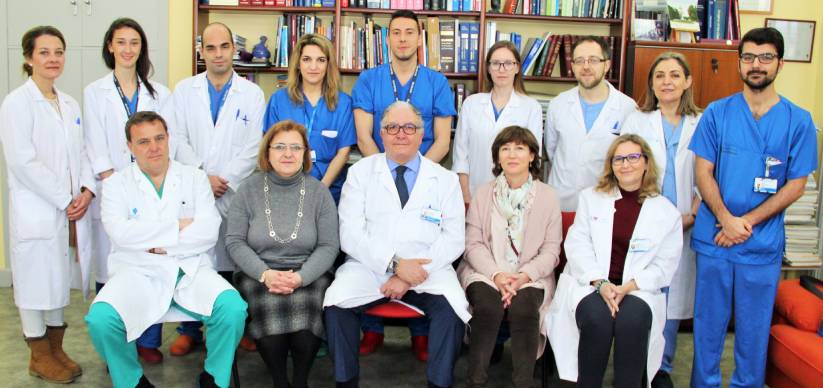
Tel. +34 913303000 (Ext. 483648)
San Carlos Clinical Hospital
3º Planta Sur C/.
Prof. Martín Lago, s/n 28040-Madrid

Since its creation in 1992, the Cancer and Obesity Group has developed numerous research projects in which researchers from the Department of Biochemistry and Molecular Biology of the Faculty of Pharmacy of the Complutense University, and researchers belonging to the Surgery II, Pathological Anatomy and Oncology Departments of the Hospital Clínico San Carlos of Madrid have collaborated. The main objectives of the work carried out have been mainly aimed at establishing the diagnosis and molecular prognosis of patients affected by different carcinogenic processes. Ultimately, these studies will be useful in the establishment of personalised therapeutic protocols, depending on the molecular alterations detected.
Currently, the tumour types under investigation are non-small cell lung cancer and gastrointestinal cancers, especially colorectal cancer, and gastric cancer.
Among the achievements of recent years, it is worth highlighting the results related to the investigation of telomeric function in non-small-cell lung cancer and colorectal cancer, with interesting associations having been found with the prognosis of patients affected by these pathologies. Based on the data from the group’s work, we believe that the different prognostic value of telomeric status in different types of human cancers could be explained through the analysis of molecules related to cellular senescence pathways. Thus, a genetic signature composed of a small number of molecules could be established, which would be useful in establishing the prognosis of patients affected by the pathologies under study and who have undergone surgery with curative intent.
Dr. Antonio J. Torres was born in Coín (Málaga), Spain (17 December 1955).
He graduated from the Faculty of Medicine of the University of Malaga in 1978. He completed his training as a surgical intern and resident at the Carlos Haya University Hospital in Malaga (Spain) where he completed his residency in General and Digestive Surgery in 1981. He then completed his residency in Thoracic Surgery at the Faculty of Medicine of the Complutense University (Hospital Clínico San Carlos) in Madrid in 1986.
Dr. Torres is certified by the Spanish Board of General and Digestive Surgery (1981) and the Spanish Board of Thoracic Surgery (1986). In 1983 he received his doctorate from the Faculty of Medicine of the Complutense University of Madrid.
After completing his residencies, Dr. Torres joined the General, Digestive and Thoracic Service of the Hospital Clínico San Carlos, in Madrid (Spain).
In 1986, Dr. Torres became Associate Professor of Surgery at the Complutense University of Madrid (Spain). In 2000, he became Professor of Surgery at the same University.
He is currently Professor of Surgery at the Complutense University of Madrid and Head of the Department of General and Digestive Surgery at the Hospital Clínico San Carlos.
His main areas of interest have been: Bariatric Surgery, Metabolic Surgery, Obesity, Gatrointestinal Hormones, Intra-abdominal Infections, Surgical Oncology and Video-Endoscopic Surgery (anti-reflux procedures, hepatobiliopancreatic surgery and obesity surgery procedures).
He is a member of 28 national and international professional associations, including the International Federation for Surgery of Obesity and Metabolic Disorders (IFSO), the International Society for Digestive Surgery, the American College of Surgeons, the European Association for Endoscopic Surgery and the Spanish Society of Surgical Surgeons.
Dr. Torres has authored or co-authored over two hundred peer-reviewed journal articles and serves as principal investigator on numerous studies, including several grants funded by government institutions.
Dr Torres was President of SECO (2007-2011) and European representative on the International Federation for Surgery of Obesity (IFSO) General Council (2008-2011).
President of IFSO (2011-12). Vice-Chairman of the IFSO Board of Trustees (2014-15).
Currently Chairman of the IFSO Board of Trustees (2015-2019), and Governor of the Spanish Chapter of the American College of Surgeons (2015-2021).
The following objectives are intended to be achieved by investigating three tumour types with a high incidence in our society: non-small cell lung cancer (NSCLC), colorectal cancer (CRC), and gastric cancer (GC).